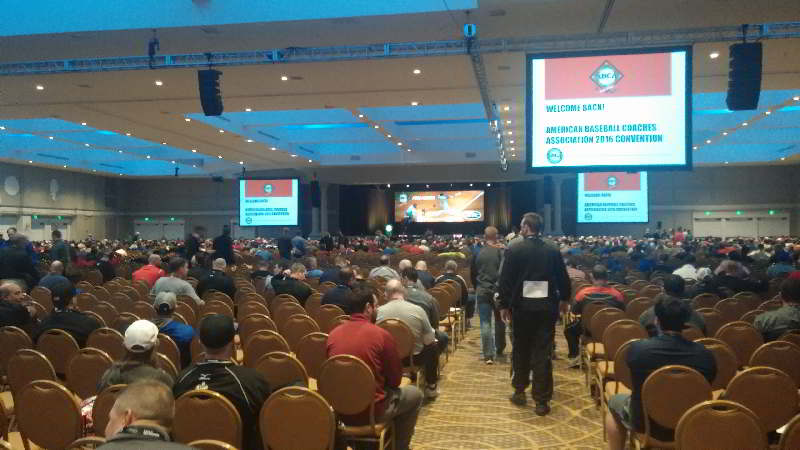ABCA 2016 - Second installment
 Have you ever wondered about what goes on at those ABCA gatherings? What are those coaches sessions really like? I often did. As I accompanied my husband Bob to numerous events but was restricted to sitting in the exhibit hall at the Cages*Plus booth, I often envied the coaches who disappeared behind those closed doors to attend the coaches’ sessions.
Have you ever wondered about what goes on at those ABCA gatherings? What are those coaches sessions really like? I often did. As I accompanied my husband Bob to numerous events but was restricted to sitting in the exhibit hall at the Cages*Plus booth, I often envied the coaches who disappeared behind those closed doors to attend the coaches’ sessions.
Finally, this year at the 2016 ABCA, I got my chance. So the following is a woman’s perspective of the coaches’ sessions:
We’re here and seated—our first time to actually attend ABCA rather than exhibit. I finally am getting to satisfy my curiosity about those closed coaches sessions. I will try to give a woman’s perspective into what goes on. Talk about outnumbered. . . as far as I can see, no other female is in view.
This is supposed to be the largest attended workshop ever—it was just announced that the coaches should move forward and squeeze in. The chairs are so small and these men so big, that most are opting to leave an open seat between them for comfort. So we’ll see how well that works. No response near me so far.
Chatter is going on all around me. Many coaches seem to know each other. Their teams sometimes have competed. Some seem to have even played or worked together in the past. The camaraderie is palpable.
Wait---unless that collar length hair is on a man I think I just spotted another woman. Since most of the men in this room are very clean cut, I think I’m not alone after all.
The announcer keeps saying “Ladies and Gentlemen” so that helps me feel a little more welcome.
The ballroom we are in is huge with 3 screens across the front and 2 midway back. So the speakers are clearly visible.
A cute blonde teenage girl just sang “God Bless America.” She sang with conviction. And I stood with all the attendees around me out of respect.
Preliminaries completed, the first speaker, Brian O'Conner was introduced. His list of accomplishments was long. But I think I might have even recognized him from watching college ball on TV.
Brian thanked the man who introduced him and said he wished someone would tell his wife about all hose accomplishments. Then he began his talk by saying “Nobody in the game has a trademark on coaching.” The UVa way is just “a” way, not “the” way. Then he began to answer the question of “Why we do what we do?” His 3 responses were to:
1. Educate and develop winners. Players need to be taught and to develop.
2. Build something and make it better.
3. Be compelled to make difficult decisions. Coaches love decisions requiring them to think, ”What is best for the team?”
He went on to give more personal advice:
Stay connected to people who influenced you as a coach.
Be a family man first.
Have respect for the profession.
He said coaches have many opportunities to learn from mistakes and successes. He recounted a first year, first game, mistake of being angry with his players in the shower. And his more recent experience of arguing with and bumping an umpire—for which he was suspended 4 games. (I admired his openness and recognition that others might learn from his mistakes.)
He mentioned the statistic that around 475 thousand students play high school baseball, but only around 10 thousand play college ball. So high school coaches have the best opportunity to impact lives.
Creating a loyal environment where staff works well together was also mentioned as significant. He admonished coached to empower people, to collaborate, trust and communicate. “Nothing tears apart a team quicker that disloyalty.” He advised the coaches to surround themselves with the right people, to define their responsibilities and let them do their job. He especially stressed that Everyone Matters—all staff, grounds keepers, etc. and that routines are important.
Coach O’Connor recounted a lesson learned after losing a tournament. When he and his staff met with the players, the coaches learned that their yelling and screaming at tournaments made players tighter. Subsequently, the coaches made an effort to have the team look at advancing to tournaments as a reward and to have fun.
Much of what Coach O’Connor had to say was meant strictly for coaches, but could have meaning for all of us. We can all benefit from investing in relationships and collaborating with others.
He listed some collaboration goals:
Recommit to being loyal.
Don’t listen to outsiders.
Take care of the game.
Communicate, having regular meetings.
Develop a championship culture.
He stressed serving others. Develop an unselfish team first mentality. Let players fail so they can succeed. Don’t let people complain and don’t allow excuses. Turn negatives into positive teaching moments. “You always have another chance to redeem yourself.”
As an outsider and a woman, I especially appreciated the 5 expectations the coach had which need no talent:
Be early.
Be prepared.
Have consistent effort and energy.
Have the right attitude and body language.
Treat others with respect.
Those five pieces of advice apply to any of us anywhere and especially to those of us who influence young lives.




Leave a comment
All comments are moderated before being published.
This site is protected by hCaptcha and the hCaptcha Privacy Policy and Terms of Service apply.